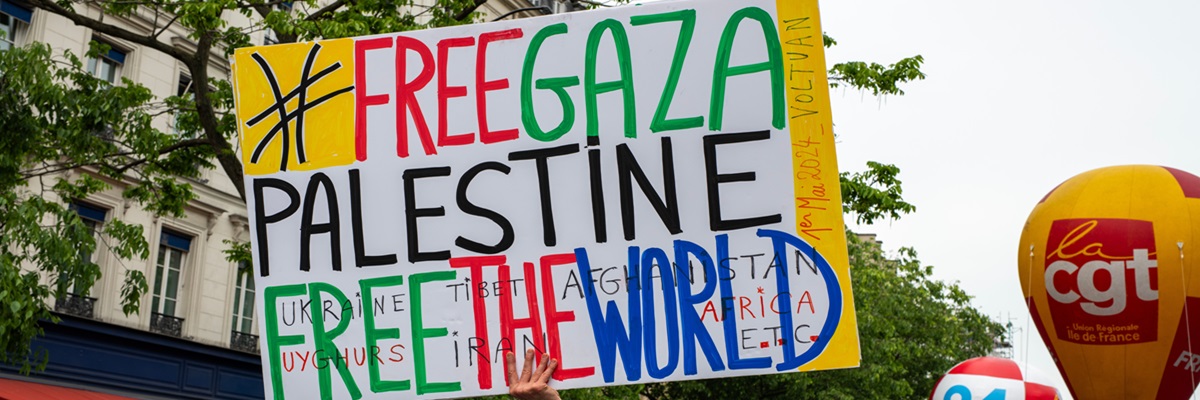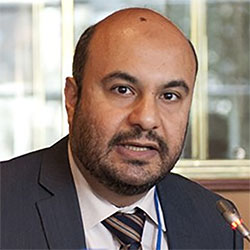Defense & Security
Political Insights (8): European Positions on Operation al-Aqsa Flood and the Israeli War on Gaza Strip:

Image Source : Shutterstock
Subscribe to our weekly newsletters for free
If you want to subscribe to World & New World Newsletter, please enter
your e-mail
Defense & Security

Image Source : Shutterstock
First Published in: Jun.13,2024
Sep.09, 2024
Consistent with past behavior observed in previous instances of wars against Gaza Strip (GS), European capitals swiftly and predictably condemned the attack by Palestinian resistance forces on Israeli targets on 7/10/2023 in strong terms. This event was often portrayed with a clear bias towards Israel’s narrative, overlooking its background and context, and disregarding its military objectives, which primarily targeted Israeli occupation bases and barracks. Some European capitals took considerable time to reassess their positions and strive for a more balanced approach.
In the first weeks of the war, political and media narratives in most European countries leaned towards portraying Israeli occupation as the victim, depicting the resistance’s actions as typical terrorist attacks akin to tragic events in Western countries. This narrative provided propaganda support to justify the brutal assault on GS. The aggression was justified by emphasizing “Israel’s right to self-defense,” echoing Israeli leadership’s claims of the resistance “using civilians as human shields,” all while neglecting international law and the safety of Palestinian civilians. Some European countries reacted vehemently during the genocidal war. They suspended aid to the Palestinian Authority (PA) for a period, then penalized the United Nations Relief and Works Agency for Palestine Refugees in the Near East (UNRWA) by withholding funding following Israel’s inflammatory accusations against the agency, only to later reverse these actions.
Generally speaking, European positions during the GS war diverged along at least three lines, with relative differences in attitudes within each line: • Germany, Austria, Hungary, the Czech Republic and other countries adopted an overwhelmingly pro-Israeli position that remained almost unchanged. • A trend that increasingly criticized the genocidal war and moved in a positive direction. This was evident in Ireland, Spain, Belgium, Malta, Norway and Slovenia. • A third trend avoided clear criticism without being at the forefront of partisanship, or vacillated in some positions, as in the case of France, which relatively modified its position in the second month of the war. These trends were evident in the positions on the ceasefire during the first months of the war, in voting behavior in international bodies, in taking punitive measures against the PA and UNRWA, and in the position on imposing sanctions on settlers.
This divergence in positions has placed a burden on the High Representative of the EU for Foreign Affairs and Security Policy Josep Borrell to articulate a coherent position representing the Union during this war. Non-EU member states, such as Britain, have adopted positions aligned with the US, while Norway has expressed critical attitudes toward the war. The prolonged duration of the war, the exposure of its brutality, and the growing public and elite opposition to it have led to a weakening of support for the war within Europe and have encouraged the opposite front. The divergence in positions was evident in that the EU was only able to reach a joint resolution supporting a ceasefire in GS in March 2024. This came with great difficulty due to the intransigence of capitals overwhelmingly aligned with Israel, which obstructed this step for almost half a year of the war. European positions have been weakened and discredited due to their contradictions, particularly regarding the Ukraine war. Positions favoring a brutal genocidal war have severely tarnished the image of the concerned European countries. Germany was even brought before the International Court of Justice (ICJ) after Nicaragua filed a lawsuit against it for “facilitating the commission of genocide” against Palestinians in GS via its arms exports to Israel. It is clear that the positions of many European countries are causing significant losses in terms of image, soft power and the privilege of moral guardianship that they once enjoyed as traditional defenders of “human rights” and “universal values.” These positions have also galvanized massive public protests within European countries, although these protests have not prompted significant political responses. Weaknesses in European positions have become apparent due to the lack of diplomatic initiatives from the EU or any of its member states, despite the active involvement of European actors across the region. Calls for a diplomatic solution, an end to the war or even statements advocating “restraint” have notably been missing from the primary European positions on the GS war. This omission can be attributed to the current alignment with the US administration and the influence of the prevailing support for the Israeli narrative of the war within Europe.
Merely expressing support for the “two-state solution,” pledging aid, and expressing concern for the humanitarian situation of Palestinians in Gaza Strip often serves as a superficial gesture, aligning more with the ongoing occupation and the devastating war on GS. These positions may also involve condemning Israeli “settler violence” in the West Bank (WB) and issuing threats of punitive actions against certain individuals, while simultaneously absolving the Israeli military of any accountability and deflecting criticism from the war on GS. The critical position toward Israel became evident through early voting behavior favoring a ceasefire in international forums, initiatives within EU bodies supporting this inclination, and the near-simultaneous recognition of the State of Palestine in Madrid, Dublin, Oslo and Ljubljana. This exerted pressure on other European countries, despite their customary declarations of support for the “two-state solution,” to reconsider their positions. However, major European capitals of influence, such as Berlin, Paris, London and Rome, still refrain from taking clear positions in pressuring Israel or recognizing the state of Palestine.
Since the war began, European capitals involved in decision-making have been eager to contain the war within GS. The prolonged duration of the war exerts pressure in this direction, particularly amidst concerns over potential escalation at the volatile Lebanese front and ongoing tensions and attacks near the Yemeni coasts and in the Red Sea region. European countries have taken noticeable steps in response, highlighted by French diplomatic efforts in Lebanon and the surrounding areas. Concurrently, European countries have refrained from participating in military maneuvers in the Red Sea, aligning themselves distinctively from US and British forces, thereby signaling a strategy to avoid direct entanglement in regional tensions.
The positions of European decision-making centers have been notably influenced by the manifestations of Western strategic polarization in the wake of the Ukraine conflict, with Europe notably aligning with the US administration. Western powers seem to acknowledge the potential geopolitical ramifications of either losing the current war in GS or allowing it to escalate regionally. Moreover, the ongoing war serves as a significant test for the effectiveness of Western weapons, security and defense systems, particularly following the sudden blow on 7/10/2023. European parties’ concern for the strength of the Western alliance and transatlantic ties also motivates them to avoid weakening the position of President Joe Biden’s administration. Biden faces a challenging electoral test to renew his presidential term against Donald Trump, whose potential return to the White House raises concerns among Europeans.
Despite the mounting European criticisms of the Israeli occupation and the brutal genocidal war, the influential European position continues to refrain from imposing significant censure or punitive measures against Israel. Furthermore, it appears to align with the positions of its US ally on this matter, actively seeking harmony with them. However, Israel is increasingly posing a burden on Europe. While there is a gradual and hesitant shift towards greater recognition of the impossibility of Israel remaining above the law, along with an increased acknowledgment of the rights of the Palestinian people and the urgency to address them, this trend is becoming increasingly apparent. This is accompanied by waning confidence in the ability to overcome Palestinian resistance. Moreover, there is a growing unity among the Palestinian population in support of resistance, in the wake of the failure of the Oslo process and the pursuit of a peaceful solution.
First published in :

Hossam Shaker is a researcher and author consultant in media public relations and mass communication for a number of organizations in Europe and he resides in Vienna. He has an interest in analysis of European and international affairs as well as social and media issues.
Unlock articles by signing up or logging in.
Become a member for unrestricted reading!